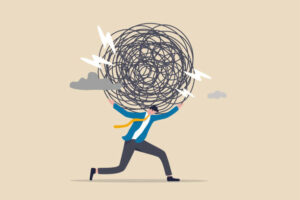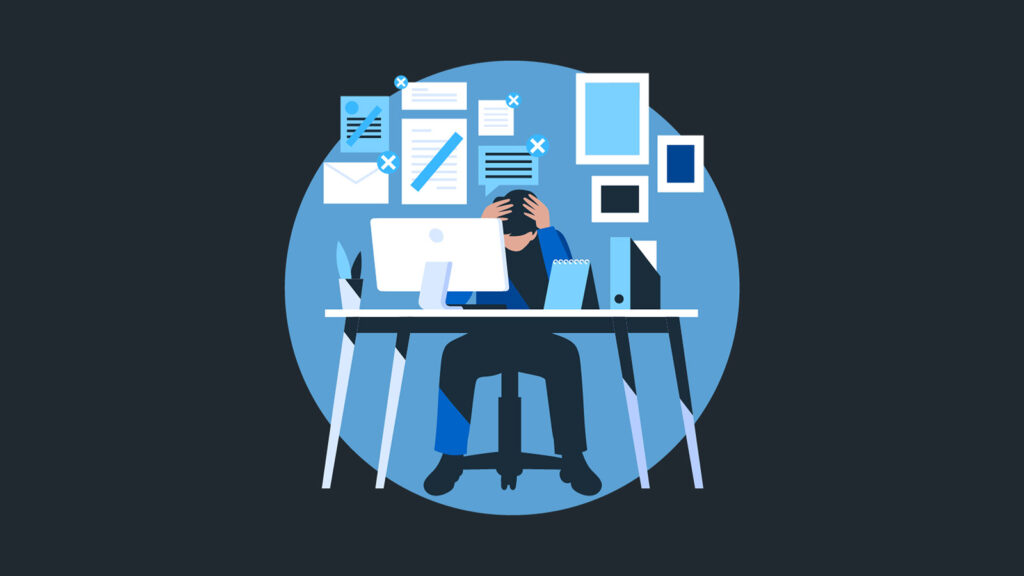Do you find yourself feeling anxious when you go to work? Do you feel like you can’t focus, and that everything is a huge effort? You’re not alone. Work anxiety is very common, especially in today’s competitive job market. But don’t worry, there are things that you can do to stay productive and manage your anxiety. In this blog post, we will discuss some tips for dealing with work anxiety.
What Is Work Anxiety?

Work anxiety is a type of anxiety that is characterized by feelings of worry, stress, and fear. It can be caused by a variety of factors, such as job insecurity, workload, deadlines, or even office politics. Work anxiety can lead to physical symptoms such as headaches, fatigue, and difficulty concentrating. It can also affect your mood and how you interact with others.
It’s important to note that work anxiety is different from job stress. Job stress is a normal response to a challenging situation, such as a tight deadline. Work anxiety is an excessive and persistent form of stress that can interfere with your ability to do your job.
Types Of Work Anxiety
There are two main types of work anxiety:
Generalized anxiety disorder
This is a type of anxiety disorder that is characterized by chronic and excessive worry. People with a generalized anxiety disorder may have difficulty concentrating, sleeping, or relaxing. They may also experience physical symptoms such as headaches, fatigue, and muscle tension.
Social anxiety disorder
This is a type of anxiety disorder that is characterized by feelings of fear and distress in social situations. People with this disorder may have difficulty talking to people, attending meetings, or making presentations. They may also avoid social situations altogether.
It’s important to remember that work anxiety is different from stress. Stress is a normal response to a demanding situation, and it can be helpful in some cases. Work anxiety, on the other hand, is excessive and can interfere with your ability to work effectively.
Side Effects Of Work Anxiety

Several side effects can come with work anxiety. These include:
- Difficulty concentrating
- Feeling overwhelmed
- Procrastination
- Perfectionism
- Difficulty sleeping
- Inability to meet deadlines
- Migraines
- Muscle tension
- Fatigue
These side effects can have a negative influence on an individual’s work performance, making them feel inadequate and have low self-esteem in comparison to their peers. These also cause a decline and work quality and gaps in achieving work-oriented goals, deadlines, and missing tasks.
Tips For Managing Work Anxiety
If you’re feeling anxious at work, it’s important to remember that you’re not alone. Many people experience work anxiety at some point in their careers. However, there are things that you can do to manage your anxiety and stay productive. You can either approach a professional for guidance or make use of self-help strategies.
Therapy For Work Anxiety

One option for dealing with work anxiety is to seek out therapy. A therapist can help you identify the root causes of your anxiety and develop a plan for managing it. therapy can be an effective way to deal with work anxiety, but it’s important to find a therapist that you trust and feel comfortable with.
Therapy can be time-consuming, so it’s important to make sure that it’s the right option for you. If you’re not sure if therapy is right for you, you can always talk to your doctor or mental health professional. It’s also important to remember that therapy is not a quick fix, and it may take some time to see results.
Some common types of therapeutic techniques which help in dealing with anxiety are:
Cognitive-behavioral therapy
This type of therapy helps you identify and change the negative thoughts and behaviors that contribute to your anxiety.
Exposure therapy
This type of therapy involves gradually exposing yourself to the things that make you anxious. Exposure therapy can help you learn to manage your anxiety and may eventually lead to a decrease in symptoms.
Psychotherapy
This is a type of therapy that focuses on your thoughts, emotions, and behaviors. It can help you understand the root causes of your anxiety and develop healthy coping mechanisms.
Relaxation techniques
Relaxation techniques, such as deep breathing and progressive muscle relaxation, can help you manage your anxiety by reducing stress.
Note that it is important to consult a professional with relevant qualifications, experience, and expertise for maximum effect.
Self Help Tips

In addition to therapy, one can also learn some beneficial self-care strategies to help and deal with this anxiety.
Create A Routine
Having a set routine can help to reduce feelings of anxiety and uncertainty. Try to wake up at the same time each day, eat regular meals, and take breaks at the same time each day. This will help to create a sense of stability and predictability in your life.
Identify the source of your anxiety
What is it about your job that makes you anxious? Is it your workload, deadlines, or something else? Once you identify the source of your anxiety, you can start to address it.
Talk to someone about your anxiety
It can be helpful to talk to a trusted friend or family member about your anxiety. This can help you to understand your anxiety and develop a plan for dealing with it.
Changing your thinking patterns
Negative thoughts can contribute to anxiety. If you find yourself thinking negative thoughts, try to challenge them. For example, if you’re thinking “I can’t do this,” try to counter it with a positive thought such as “I can do this.”
Develop a healthy lifestyle
Eating right, exercising, and getting enough sleep can help you to manage stress and anxiety.
Talk to someone who can help
If you’re feeling anxious about work, talk to your supervisor, HR representative, or a trusted co-worker. They can provide support and guidance on how to deal with your anxiety.
Make time for relaxation
Schedule some time each day to relax and do something that you enjoy. This can help you to reduce stress and improve your mood.
Work anxiety can be difficult to deal with, but there are things that you can do to manage it. By following these tips, you can stay productive and keep your anxiety under control.
Conclusion
If you’re struggling with work anxiety, remember that you’re not alone. There are things that you can do to manage your anxiety and stay productive. Talk to your doctor or mental health professional about therapy and self-care strategies that can help you deal with work anxiety. With the right support, you can overcome work anxiety and improve your quality of life.
A Word From MantraCare Wellness
Employee wellness programs are the key to improving employee motivation, productivity, and retention. At MantraCare Wellness, we have a team of health experts, counselors, and coaches who serve corporate employees with 10+ wellbeing programs including EAP, Employee Diabetes Reversal, Corporate MSK, PCOS, Employee Fitness, Corporate Yoga, Employee meditation, and Employee Smoking Cessation.



